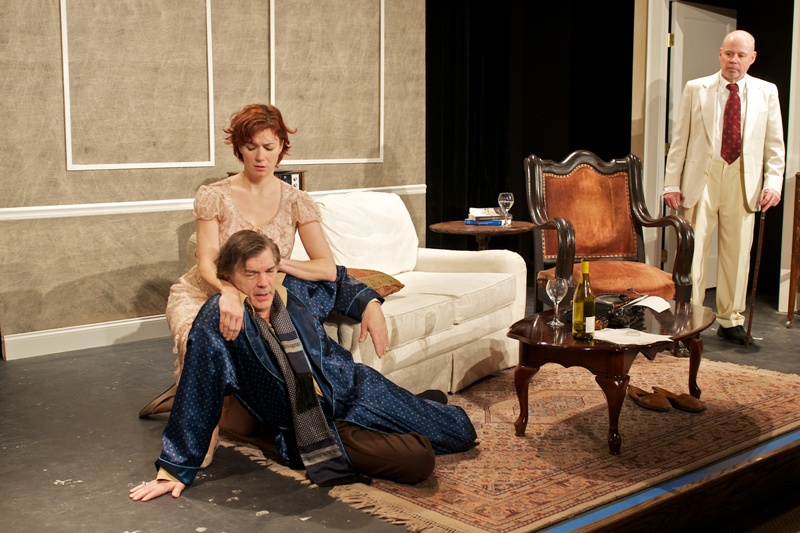
Tenley Bank and Kenneth John McGregor in a scene from South Camden Theatre Company's TENNESSEE'S FINAL CURTAIN. (Photo credit: Rich Ratner)
Walking into the South Camden Theatre taking a good look at the scene set for TENNESSEE’S FINAL CURTAIN introduces you to another place. The intimate set has a formality associated with a high class hotel sitting room and yet it contains a sense of disconnection. From the beginning and the increasingly loud knocking on the hotel room door to the staggering entrance of the main character, there is a sense of “problem”.
Joseph M. Paprzycki’s script for TENNESSEE’S FINAL CURTAIN introduces lots of “problems” but they don’t apply to this production quietly, capably handled by Allen Radway . The “problems” are related to several of the life-long demons with which Tennessee Williams fought all his life. From his first step (or perhaps lurch is more descriptive) on stage, Kenneth John McGregor, brings a sense of struggle to his character. Hair and clothes in disarray, omnipresent drink, and erratic gestures are all part of the Tennessee Williams persona we encounter. The juxtaposition of this image with the polished and affable hotel clerk, Donald, played with equal parts of New York street smarts and monied aplomb by Jihad Milhem, causes the audience to metaphorically shake their heads and wonder … “THAT is Tennessee Williams?”. Paprzycki does not write about the genteel southern aristocrat often presented in other works about Williams. Paprzycki give us a totally different view … this is Williams storming against the elements that have kept him from what he considers his deserved happiness. McGregor’s Williams is forceful and yet amenable; he is loud yet manipulative; he is a man facing and fighting personal demons. With this much emotion on the stage, the seduction scene in Act II actually seemed out of place and perhaps that is something for Paprzycki to consider.
In other biographical works on Williams, it is clear that the largest influence on him was his mother. Paprzycki chooses not to include the mother in his writing and only mentions the brother in passing. Instead, he uses the much loved sister and the much hated father, to bookend the dichotomies with which Williams lived. The audience is presented with reminiscences of both sister, Rose, and Father. It is handled with scrims and altered lighting. That is an interesting and well solved problem for Radway as the script has the hotel clerk remaining in the room showing his alternating levels of concern and then panic as McGregor thrashes around the stage talking to people who he does not perceive as being there.
The director, Allen Radway, obtains poignant and yet emotionally charged performances from his cast. William Rahill gives a performance of Father to make the most even-tempered among us wish that someone would simply STOP him from doing further damage. Rahill portays Father as a bully without making him a personification of evil. Rahill brings a sense of Father’s needs and subsequent perceived losses in life to show what hope he had placed in his eldest son and from whom he received nothing but perceived failure and later on, hatred. Swaggering autonomy was the order of the day on theatre stage. Under the expert direction of Radway, it was clear that the son had been influenced by his Father … and not in a good way!
Tenley Gwen Bank gives a performance of opposites as Rose. The audience watches, enthralled, as Bank presents the tragically sick and mishandled Rose as diametrically opposite her troubled brother. Bank’s very different emotional and physical levels are easy for the audience to absorb as she calmly glides around the stage assuaging William’s guilt and stroking his head to keep him from arguing with Father.
All in all, it is NOT your well known presentation of Tennessee Williams. SCTC has presented it as almost Shakespearean in nature. It is a tragedy not hidden in southern gentility but which rages on the stage giving us the essence of a man who has been dying in increments for years and now has decided to take the fight to his ghosts.
Well done.
TENNESSEE’S FINAL CURTAIN
Written by Joseph M. Paprzycki
Directed by Allen Radway
February 10-26, 2012
South Camden Theatre Company
Waterfront South Theatre
400 Jasper Street
Camden, NJ 08104
Box Office: 1-866-811-4111
www.southcamdentheatre.org


